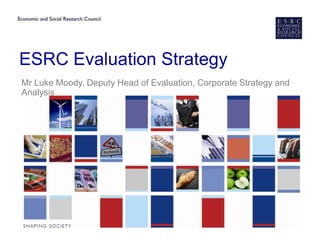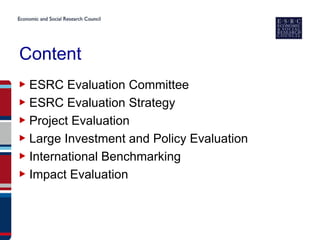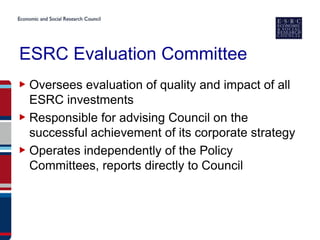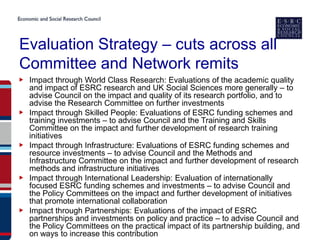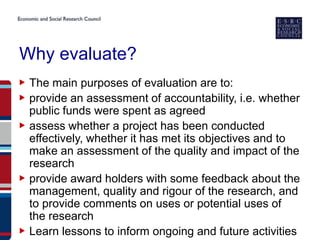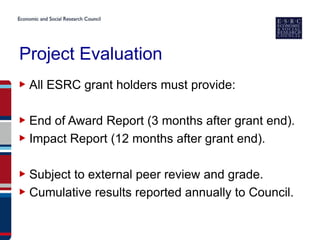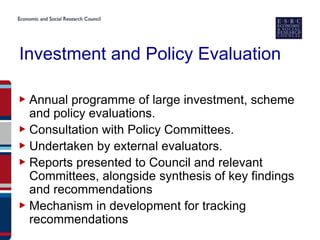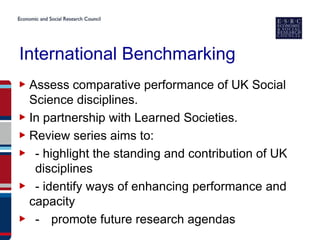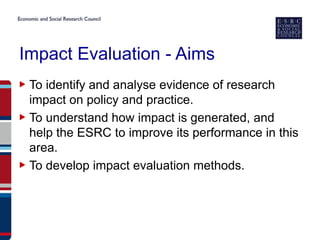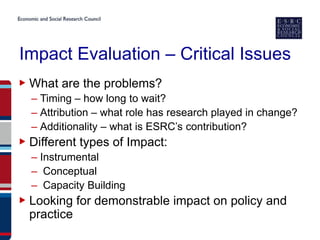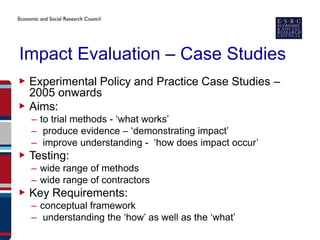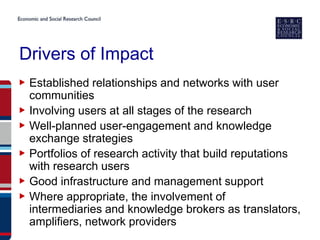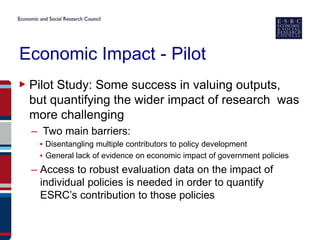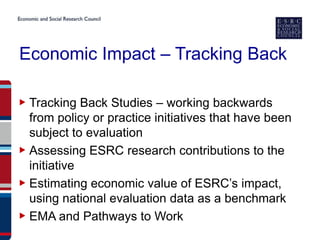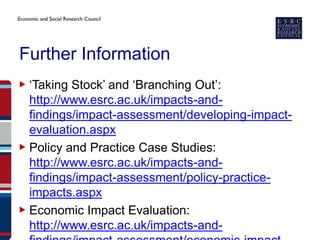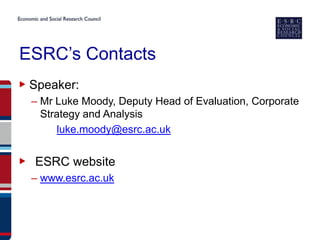ESRC Evaluation strategy
- 1. ESRC Evaluation Strategy Mr Luke Moody, Deputy Head of Evaluation, Corporate Strategy and Analysis
- 2. Content âķ ESRC Evaluation Committee âķ ESRC Evaluation Strategy âķ Project Evaluation âķ Large Investment and Policy Evaluation âķ International Benchmarking âķ Impact Evaluation
- 3. ESRC Evaluation Committee âķ Oversees evaluation of quality and impact of all ESRC investments âķ Responsible for advising Council on the successful achievement of its corporate strategy âķ Operates independently of the Policy Committees, reports directly to Council
- 4. Evaluation Strategy â cuts across all Committee and Network remits âķ Impact through World Class Research: Evaluations of the academic quality and impact of ESRC research and UK Social Sciences more generally â to advise Council on the impact and quality of its research portfolio, and to advise the Research Committee on further investments âķ Impact through Skilled People: Evaluations of ESRC funding schemes and training investments â to advise Council and the Training and Skills Committee on the impact and further development of research training initiatives âķ Impact through Infrastructure: Evaluations of ESRC funding schemes and resource investments â to advise Council and the Methods and Infrastructure Committee on the impact and further development of research methods and infrastructure initiatives âķ Impact through International Leadership: Evaluation of internationally focused ESRC funding schemes and investments â to advise Council and the Policy Committees on the impact and further development of initiatives that promote international collaboration âķ Impact through Partnerships: Evaluations of the impact of ESRC partnerships and investments on policy and practice â to advise Council and the Policy Committees on the practical impact of its partnership building, and on ways to increase this contribution
- 5. Why evaluate? âķ The main purposes of evaluation are to: âķ provide an assessment of accountability, i.e. whether public funds were spent as agreed âķ assess whether a project has been conducted effectively, whether it has met its objectives and to make an assessment of the quality and impact of the research âķ provide award holders with some feedback about the management, quality and rigour of the research, and to provide comments on uses or potential uses of the research âķ Learn lessons to inform ongoing and future activities
- 6. Project Evaluation âķ All ESRC grant holders must provide: âķ End of Award Report (3 months after grant end). âķ Impact Report (12 months after grant end). âķ Subject to external peer review and grade. âķ Cumulative results reported annually to Council.
- 7. Investment and Policy Evaluation âķ Annual programme of large investment, scheme and policy evaluations. âķ Consultation with Policy Committees. âķ Undertaken by external evaluators. âķ Reports presented to Council and relevant Committees, alongside synthesis of key findings and recommendations âķ Mechanism in development for tracking recommendations
- 8. International Benchmarking âķ Assess comparative performance of UK Social Science disciplines. âķ In partnership with Learned Societies. âķ Review series aims to: âķ - highlight the standing and contribution of UK disciplines âķ - identify ways of enhancing performance and capacity âķ - promote future research agendas
- 9. Impact Evaluation - Aims âķ To identify and analyse evidence of research impact on policy and practice. âķ To understand how impact is generated, and help the ESRC to improve its performance in this area. âķ To develop impact evaluation methods.
- 10. Impact Evaluation â Critical Issues âķ What are the problems? â Timing â how long to wait? â Attribution â what role has research played in change? â Additionality â what is ESRCâs contribution? âķ Different types of Impact: â Instrumental â Conceptual â Capacity Building âķ Looking for demonstrable impact on policy and practice
- 11. Impact Evaluation â Case Studies âķ Experimental Policy and Practice Case Studies â 2005 onwards âķ Aims: â to trial methods - âwhat worksâ â produce evidence â âdemonstrating impactâ â improve understanding - âhow does impact occurâ âķ Testing: â wide range of methods â wide range of contractors âķ Key Requirements: â conceptual framework â understanding the âhowâ as well as the âwhatâ
- 12. Drivers of Impact âķ Established relationships and networks with user communities âķ Involving users at all stages of the research âķ Well-planned user-engagement and knowledge exchange strategies âķ Portfolios of research activity that build reputations with research users âķ Good infrastructure and management support âķ Where appropriate, the involvement of intermediaries and knowledge brokers as translators, amplifiers, network providers
- 13. Economic Impact - Pilot âķ Pilot Study: Some success in valuing outputs, but quantifying the wider impact of research was more challenging â Two main barriers: ⊠Disentangling multiple contributors to policy development ⊠General lack of evidence on economic impact of government policies â Access to robust evaluation data on the impact of individual policies is needed in order to quantify ESRCâs contribution to those policies
- 14. Economic Impact â Tracking Back âķ Tracking Back Studies â working backwards from policy or practice initiatives that have been subject to evaluation âķ Assessing ESRC research contributions to the initiative âķ Estimating economic value of ESRCâs impact, using national evaluation data as a benchmark âķ EMA and Pathways to Work
- 15. Developing Impact Evaluation âķ Conceptual Impact â Child Poverty Policy âķ Impact of Infrastructure â Economic impact infrastructure investment: the Economic and Social Data Service (ESDS) âķ Impact of Skilled People â People-flow impacts in the Welsh Government
- 16. Further Information âķ âTaking Stockâ and âBranching Outâ: http://www.esrc.ac.uk/impacts-and- findings/impact-assessment/developing-impact- evaluation.aspx âķ Policy and Practice Case Studies: http://www.esrc.ac.uk/impacts-and- findings/impact-assessment/policy-practice- impacts.aspx âķ Economic Impact Evaluation: http://www.esrc.ac.uk/impacts-and-
- 17. ESRCâs Contacts âķ Speaker: â Mr Luke Moody, Deputy Head of Evaluation, Corporate Strategy and Analysis luke.moody@esrc.ac.uk âķ ESRC website â www.esrc.ac.uk
Editor's Notes
- #4: The Evaluation Committee is chaired by a Council member. Other members are appointed by Council for two years and are drawn from a range of academic and non-academic backgrounds.ĖýProf Ann Buchanan, University of Oxford (Chair) Prof Paul Anand, Economics, Open University Prof Tara Fenwick, Stirling Institute of Education, University of Stirling Prof Brian Francis, Mathematics and Statistics, Lancaster University Steven Marwick, Evaluation Support Scotland Jeremy Mayhew, Public User Member Prof Paul Milbourne,ĖýCardiff University Dr PaulĖýNightingale, University of Sussex Jeremy Peat, BBC National Trustee for Scotland Prof Ken Starkey, University of Nottingham Prof Sandra Walklate, University of Liverpool Prof Paul Whiteley, University of Essex Penny Young, National Centre for Social Research Vicki Crossley, ESRC (Secretary)
- #5: Five distinct evaluation areas that cover the full remit of ESRC activity
- #9: Six reviews have been undertaken now: Social Anthropology, Politics and International Studies, Economics, Sociology, Psychology and Human Geography. The Human Geography review is due to be published early in 2013. A forthcoming review of AIM will look more broadly at the Management and Business Studies discipline.
- #13: These outcomes have been fed back into the management of large ESRC research investments.
- #14: Pilot study in 2008; used evidence from two Research Centres: Centre for Economic Performance (CEP) and Centre on Skills, Knowledge and Organisational Performance (SKOPE).
- #16: Focusing on conceptual impacts- how social science changes ideas and the general debate, thinking and culture of a specific issue. A further development was focused on assessing the economic impact of infrastructure resources (ESDS). This focused on the value and use of the datasets held by what is now called the UK Data Service.Looking how social science contributes to the training of skilled individuals, assessing the impact that they make on society. Currently working with the Government Economic Service and Government Social Research. Government Statistical Service assessment will be published service.

